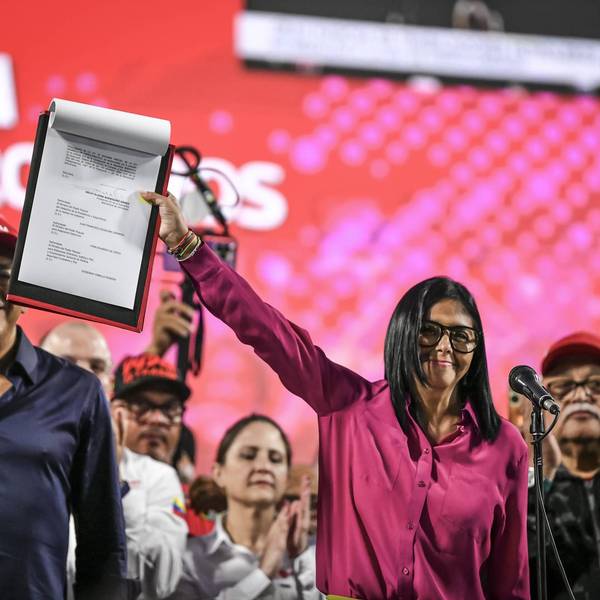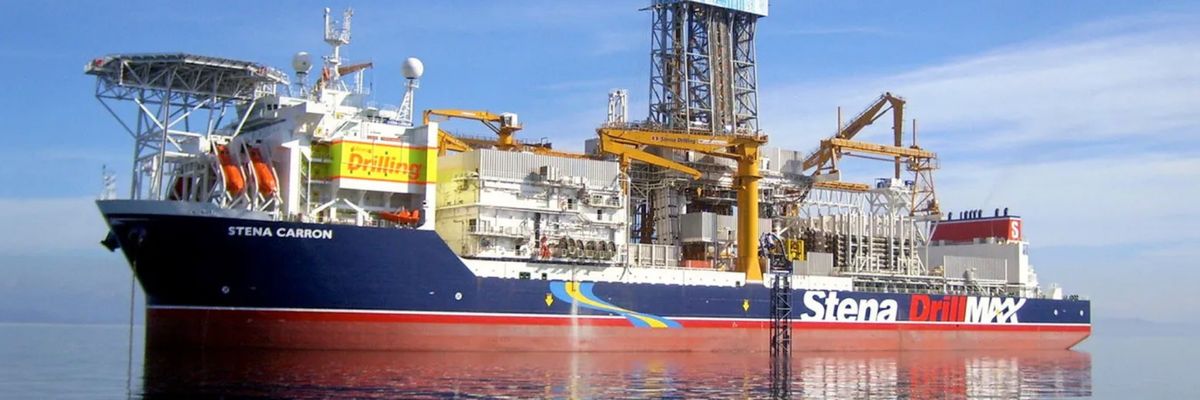As increased U.S. military aid to Guyana and ExxonMobil's oil exploration in contested waters exacerbate a territorial row between Venezuela and Guyana, satellite images made public on Friday purportedly showed increased Venezuelan military activity near the two countries' disputed border.
The Center for Strategic & International Studies (CSIS), a Washington, D.C.-based foreign policy think tank partly funded by the U.S. government and a bevy of Pentagon contractors, published satellite photos showing what the institution says is an "escalatory" buildup of Venezuelan land and naval forces near the Guyanese border.
Venezuelan Vice President Delcy Rodríguez on Thursday blamed the United States and U.S.-based ExxonMobil for inflaming tensions in contested Essequibo region after the Biden administration said earlier this week that it would help Guyana purchase new aircraft, helicopters, drones, and radar technology.
"The imperialist powers want unrestricted access and material and political control of the area and its resources."
Rodríguez condemned the "warmongering U.S. influence" and "the energy multinational [that] not only usurps the sovereignty of Guyana... but also seeks to protect its illicit operations in a sea that is pending demarcation."
ExxonMobil—which has been active in the region for more than 15 years—announced this week that it would ramp up exploration in an offshore area claimed by both Venezuela and Guyana. The Venezuelan government refuted a claim made Wednesday by Guyanese Foreign Minister Robert Persaud that the area to be explored by ExxonMobil "is within established Guyana waters in a fully demarcated area."
Rodríguez said these developments are clear violations of the Argyle Declaration, a December 2023 agreement between Caracas and Georgetown to renounce threats or use of force and settle disputes peacefully according to international law. The two countries reaffirmed their commitment to "peaceful resolution" during a summit in Brazil last month.
Venezuela has long claimed Essequibo, a resource-rich region along South America's northeastern coast that makes up around two-thirds of Guyana's territory that in 1899 was awarded by U.S., British, and Russian arbitrators to what was then the colony of British Guyana.
As Andreína Chávez Alava explained Thursday at Venezuela Analysis:
In recent months, Caracas has repeatedly denounced U.S. interference and military threats as the territorial dispute with Guyana escalated. In December, [U.S. Southern Command] carried out flight operations with the Guyana Defence Force and a British warship arrived in Guyanese waters for open sea defense exercises. In response, Venezuela held large-scale military drills of its own.
The December 3 Essequibo referendum held in Venezuela likewise raised tensions between the countries as Guyana interpreted the move as an attempt to forcefully annex the region. Voters overwhelmingly supported the country's sovereignty claim over the Essequibo and [Venezuelan President Nicolás] Maduro ordered the creation of a new Venezuelan state called Guayana Esequiba as well as civil and military institutions for the disputed area.
Anti-imperialist voices have argued that Guyana is being used as a "pawn" by the United States. The U.S. has had a long history of meddling in Venezuelan affairs in service of its strategic and economic interests.
"The current border impasse between Guyana and Venezuela is yet another example of United States imperialism's design to expand and usurp countries' natural resources around the world and reinforce its geopolitical agenda," author Richard S. Dunn wrote Thursday for Covert Action.
"With the discovery of oil in the Essequibo region, the imperialist powers want unrestricted access and material and political control of the area and its resources," Dunn added. "The United States, Britain, France, and Canada are 'piling up' over each other for control of the oil-rich Essequibo."




